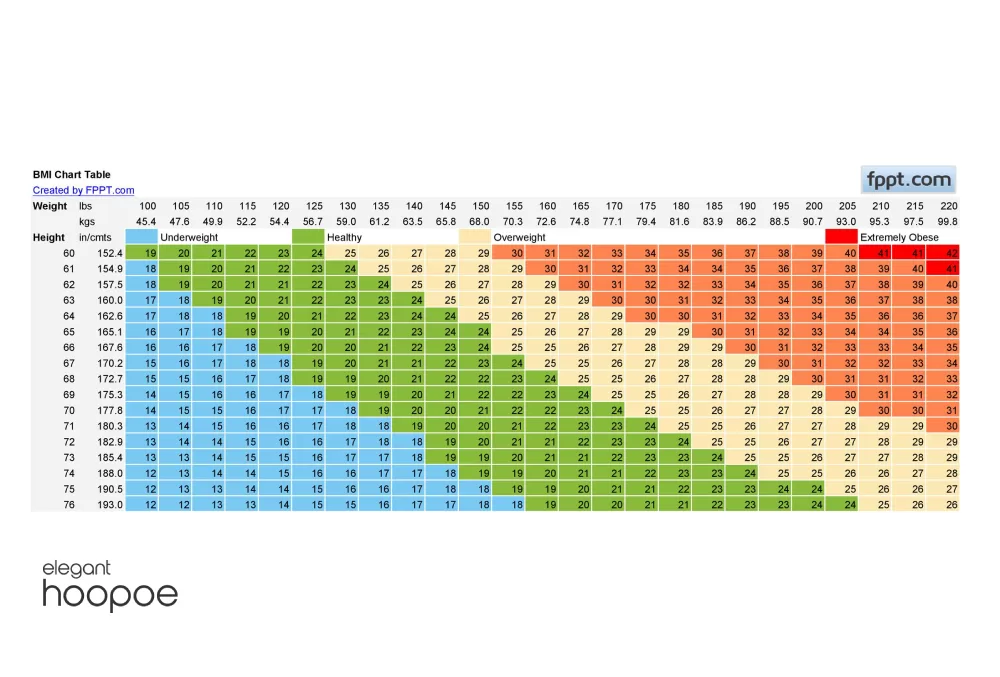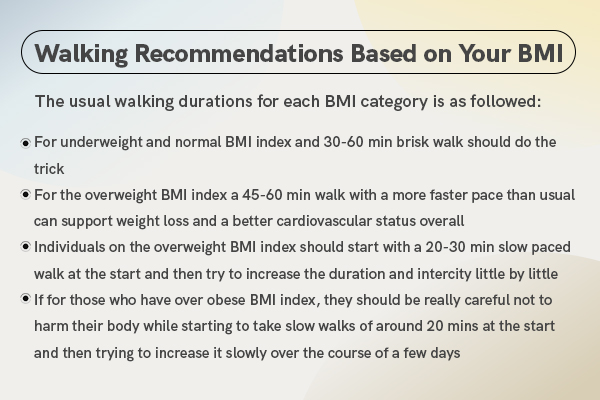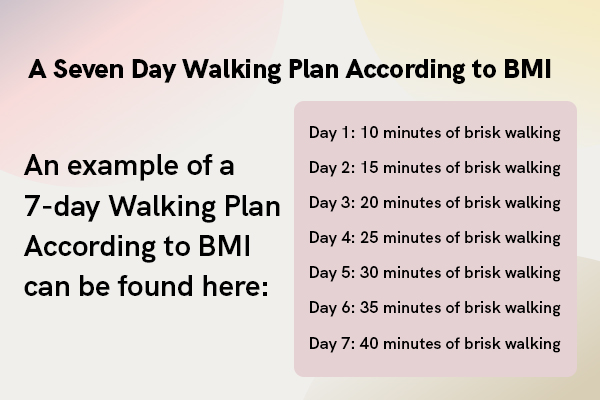How Much Should You Walk According to BMI to Lose Weight?
Walking is a simple, accessible, and highly effective exercise that promotes weight loss, enhances cardiovascular health, and reduces the risk of chronic diseases. By tailoring your walking routine according to your Body Mass Index (BMI), you can maximize benefits while minimizing the risk of injury.
This comprehensive guide explains how much you should walk according to your BMI, provides a 7-day walking plan, and offers practical tips to optimize your routine. Whether you’re a beginner or looking to refine your fitness plan, this article will help you achieve your goals.

Before starting any exercise program, especially if you have pre-existing health conditions, consult a healthcare professional. They can assess your fitness level, recommend safe intensity and duration, and guide you on progressing your walking plan according to your BMI. Let’s explore how to create a personalized walking routine that supports weight loss and overall wellness.
Understanding BMI and Its Role in Walking
What is BMI?
Body Mass Index (BMI) is a tool to estimate body fat based on your height and weight. It’s calculated by dividing your weight in kilograms by the square of your height in meters (kg/m²). Alternatively, use an online BMI calculator for quick results. The standard BMI categories are:
- Underweight: Below 18.5
- Normal Weight: 18.5–24.9
- Overweight: 25–29.9
- Obese: 30 or higher
While BMI provides a general guideline, it doesn’t account for muscle mass, age, or other factors. Consulting a healthcare professional ensures your walking plan aligns with your unique health needs.

Why Use a BMI Walking Chart?
Your BMI influences the intensity, duration, and frequency of your walking routine. Individuals with higher BMIs may need shorter, gentler walks to protect joints, while those with normal BMIs can handle longer, brisker sessions. A BMI-specific walking plan helps you:
- Build endurance and strength gradually
- Reduce the risk of injury from overexertion
- Achieve weight loss and fitness goals safely and sustainably

A BMI walking chart can guide you by recommending walking durations and intensities based on your BMI and fitness level. These charts often categorize routines as “beginner,” “intermediate,” or “advanced,” with durations ranging from 20–45 minutes of brisk walking. However, these are general guidelines—always seek professional advice before starting.
Developing a walking routine tailored to your body mass index (BMI) is one of the best ways to start a walking routine that is easy and effective, as well as an excellent way to improve your overall health and fitness, or refine your pear-shaped body.
Alternatives to exercising if you just don't feel like exercising is working for you can be body contouring procedures.
Walking Guidelines by Different BMI Categories
Here’s a detailed breakdown of how much you should walk based on your BMI, along with tips to make your routine effective and enjoyable. First, use our BMI calculator to get the best online answer possible, then start at a comfortable pace and duration, and consult a healthcare provider for personalized recommendations.
Weight
Height
Age

Underweight (BMI Below 18.5)
- Recommended Walking: 30–60 minutes daily at a moderate pace.
- Focus: Support cardiovascular health and maintain overall fitness without losing additional weight.
- Tips: Pair walking with a nutrient-rich diet to support healthy weight gain. Avoid over-exercising, which can lead to fatigue or nutrient deficiencies. Incorporate light strength training to build muscle mass and improve stamina. Monitor your energy levels and consult a dietitian to ensure adequate calorie intake.
Normal Weight (BMI 18.5–24.9)
- Recommended Walking: 30–60 minutes daily at a brisk pace (about 3–4 mph).
- Focus: Maintain fitness, enhance endurance, and promote heart health.
- Tips: Add variety by walking on different terrains (e.g., hills, trails) or incorporating intervals (e.g., 1 minute fast walking, 2 minutes slower). This keeps your routine engaging and challenges your cardiovascular system. Use a pedometer or smartphone app to track steps, aiming for 7,000–10,000 daily.
Overweight (BMI 25–29.9)
- Recommended Walking: 45–60 minutes daily at a moderate to brisk pace, gradually increasing intensity.
- Focus: Promote weight loss, improve cardiovascular health, and build stamina.
- Tips: Start with a comfortable pace and increase speed or duration by 5–10 minutes weekly. Walk on soft surfaces like grass or tracks to reduce joint stress. Consider walking with a friend or joining a group for motivation. Track progress with a fitness app to monitor steps, distance, or calories burned.
Obese (BMI 30 or Higher)
- Recommended Walking: Begin with 20–30 minutes daily at a slow to moderate pace, gradually increasing duration and intensity.
- Focus: Support weight loss, protect joints, and enhance overall health.
- Tips: Choose low-impact surfaces like treadmills or grassy paths to minimize joint strain. Wear supportive shoes to prevent discomfort. Break walks into shorter sessions (e.g., two 15-minute walks) if needed. Increase duration by 5 minutes every few days, ensuring you’re comfortable with the pace.

Just remember that this is all general advice, and for a better and safer routine, you should consider consulting a professional doctor. As stated, diets play a huge role in achieving the best result while trying to achieve your desired BMI. Read more about the 80/20 Diet Plan here!
A 7-Day BMI-Based Walking Plan to Kickstart Your Routine

This 7-day walking plan is designed for beginners, particularly those with higher BMIs, to ease into exercise safely. Adjust the duration and intensity of your walking according to your BMI, fitness level, and physical condition. Always listen to your body and consult a healthcare professional before starting.
- Day 1: 10 minutes of brisk walking
- Day 2: 15 minutes of brisk walking
- Day 3: 20 minutes of brisk walking
- Day 4: 25 minutes of brisk walking
- Day 5: 30 minutes of brisk walking
- Day 6: 35 minutes of brisk walking
- Day 7: 40 minutes of brisk walking
Tips for Success
- Warm Up and Cool Down: Spend 5 minutes stretching before and after each walk to improve flexibility and prevent injury.
- Stay Hydrated: Drink water before, during, and after your walk, especially in warm weather.
- Progress Gradually: If the plan feels challenging, reduce the duration or pace. If it’s too easy, add 5–10 minutes or increase your speed.
- Monitor Your Body: Stop if you experience pain, dizziness, or excessive fatigue, and seek medical advice.
For those with higher BMIs, starting with shorter durations (e.g., 10–15 minutes) and increasing by 5 minutes every few days helps prevent strain on joints and muscles. Use our BMI Walking Calculator (#) to estimate your ideal walking duration based on your weight and fitness level.

How Much Walking is Enough for Weight Loss Per Week?
Apart from a kickstart for your walking routine, you may want to develop your own consistent and steady routine for weight loss per week. The general recommendation for adults is 150 minutes of moderate-intensity aerobic activity (e.g., brisk walking) or 75 minutes of vigorous-intensity activity per week. This breaks down to:
- Moderate Intensity: 30 minutes, 5 days a week
- Vigorous Intensity: 25 minutes, 3 days a week

For weight loss, individuals with higher BMIs may need to exceed these guidelines, but starting slowly is key to avoiding injury. For example:
- Overweight/Obese BMI: Begin with 10–15 minutes of brisk walking daily, adding 5 minutes every few days until reaching 30–60 minutes.
- Normal/Underweight BMI: Aim for 30–60 minutes daily, adjusting intensity to maintain fitness or support weight goals.
To lose 1 pound of fat, you need a calorie deficit of approximately 3,500 calories. Brisk walking (3–4 mph) burns about 200–300 calories per hour, depending on your weight and intensity.
For example, a 200-pound person walking at 3.5 mph burns roughly 280 calories per hour. Combining walking with a balanced diet accelerates weight loss.
If you’re still wondering “How much should I walk to lose weight?”, you should consult a healthcare professional before beginning any exercise program, especially if you have pre-existing health conditions, to ensure it’s safe and appropriate for you.
Enhancing Your Walking Routine

Wear the Right Gear
Invest in high-quality walking shoes with good arch support and cushioning to reduce stress on your knees, ankles, and back. Proper footwear prevents blisters, ankle strain, and long-term injuries. Wear breathable, moisture-wicking clothing to stay comfortable, especially during longer walks.
Track Your Progress: How Much BMI Are You Losing with Walking?
Use a pedometer, fitness tracker, or smartphone app to monitor steps, distance, and calories burned. Many apps offer motivational features like goal-setting, progress charts, or virtual challenges. Aim for walking 7,000–10,000 steps daily, according to your BMI and fitness goals. Tracking helps you stay accountable and celebrate milestones.
Add Variety to Your Walks
Prevent boredom and challenge your body by:
- Changing Routes: Explore parks, neighbourhoods, or nature trails for new scenery.
- Incorporating Intervals: Alternate 1 minute of fast walking with 2 minutes of slower walking to boost calorie burn.
- Listening to Music or Podcasts: Create an upbeat playlist or download podcasts to stay entertained.
- Walking with Others: Join a walking group or invite friends to make it a social activity, which boosts motivation.
Combine with Other Activities
To enhance weight loss and overall fitness, complement walking with:
- Strength Training: Add 2–3 sessions per week to build muscle, increase metabolism, and improve body composition.
- Stretching or Yoga: Improve flexibility, reduce muscle soreness, and enhance recovery with 10–15 minutes daily.
- Healthy Diet: Focus on whole foods, lean proteins, vegetables, and healthy fats to support weight loss and energy levels. Adequate sleep (7–8 hours nightly) also amplifies the benefits of walking.

Step Up When Ready
If your body feels ready, gradually increase intensity by:
- Walking Faster: Aim for a pace where you can talk but not sing (about 3.5–4 mph).
- Adding Hills or Stairs: Increase resistance to build strength and burn more calories.
- Trying Light Jogging: Transition to slow jogging for short intervals to elevate your heart rate.
Consult a Professional About Walking According to Your BMI
A healthcare provider or certified fitness trainer can customize your walking plan, considering factors like joint health, medical conditions, or medications. They can also recommend complementary exercises or dietary changes to optimize results. For those with higher BMIs, professional guidance ensures you progress safely in your walking plan, without overloading your body. (Reference)
Listen to Your Body
Pay attention to signs of overexertion, such as joint pain, excessive fatigue, shortness of breath, or dizziness. If you experience discomfort, reduce your pace or duration and seek medical advice. Be mindful of signs of losing muscle mass, which can occur if you over-exercise or under-eat, particularly for underweight individuals.

Explore Alternatives
If walking isn’t suitable or you’re not seeing desired results, consider low-impact alternatives like swimming, cycling, or stationary biking. For some, body contouring procedures may be an option, but consult a specialist to explore these. Always prioritize activities that align with your health, preferences, and lifestyle.
Conclusion: Start Your Walking Journey Today Based on BMI
Walking is a versatile, low-impact exercise that can transform your health, support weight loss, and boost your mood. By tailoring your walking plan according to your BMI, you can create a safe, effective, and sustainable plan that fits your lifestyle and goals. Whether you’re underweight, normal weight, overweight, or obese, start with manageable steps and progress gradually to avoid injury and burnout.
Enhance your walking plan with proper footwear, a balanced diet, strength training, and adequate rest for optimal results. Always consult a healthcare professional to ensure your routine is safe and personalized, especially if you have health concerns. Take the first step today here at elegant hoopoe—your journey to a healthier, more active life begins with a single walk!







